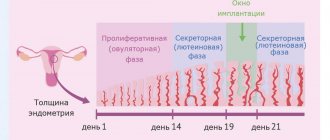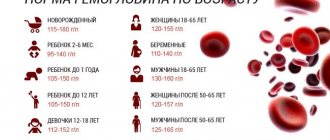HCG is a unique hormone produced in the body after fertilization of an egg. Otherwise called human chorionic gonadotropin. It begins to be produced approximately immediately after the process of attaching the egg to the walls of the uterus. Gonadotropin is formed in the membrane of the embryo and is detected in blood or urine tests. In the first option, the likelihood of obtaining an accurate result is higher, since the concentration of gonadotropin in the blood is much higher.
The medical center is equipped with its own laboratory and the latest diagnostic equipment. With us you can donate blood for hCG analysis and get results as quickly as possible with high accuracy. Express diagnostics are performed within 20 minutes! You can sign up for a consultation and get tested at a convenient time, we work every day, seven days a week.
HCG level and growth
The hormone allows you to track the normal or problematic course of pregnancy. The embryonic period (from conception) is always less than the obstetric period (counted from the last menstruation) by 2 weeks. The Private Practice Clinic offers pregnancy tracking from the 1st week.
The analysis can be done after ten days from fertilization. Every 2 days the hormone level doubles. Since the membrane of each embryo secretes a certain amount of gonadotropin, this helps to calculate how many fetuses are present.
The increase in hCG over the weeks of pregnancy allows you to track how the fetus develops and detect pathologies in time. Any deviations from the accepted standard values indicate disruptions in embryonic development. The highest levels of gonadotropin are from the 7th to the 10th week. After this, the growth of chorionic hormone decreases somewhat and freezes at these values until the 2nd half of the term. The age of the embryo can be determined using the tables presented below.
Why take an HCG test?
HCG analysis is mandatory to determine the exact duration of pregnancy. In addition, it allows you to monitor the woman’s condition and the effectiveness of treatment.
If the screening shows a low level of hCG, then additional blood testing is required to detect the hormone. The results of the study will allow us to assess the risk of developing pathology in a child and the likelihood of preserving the fetus.
Often tests show incorrect values. In girls, there is a delay and hCG is below normal, but the pregnancy is progressing well. To get accurate indicators, you must adhere to several rules:
- donate blood from a vein;
- do the analysis in the morning on an empty stomach;
- donate blood only 2.5-3 weeks after the expected fertilization.
Therefore, you should not trust the test (doctors say that it can be positive even in men), but wait a little and take all the necessary tests. Only they will give an accurate assessment of the girl’s condition.
HCG by days from conception
| Post-ovulation days | Hormone level | |
| High | Short | |
| Exactly one week | 10 | 2 |
| 8 | 18 | 3 |
| 9 | 21 | 5 |
| 10 | 26 | 8 |
| 11 | 45 | 11 |
| 12 | 65 | 17 |
| 13 | 105 | 22 |
| Two weeks | 170 | 29 |
| 15 | 270 | 39 |
| 16 | 400 | 68 |
| 17 | 580 | 110 |
| 18 | 840 | 220 |
| 19 | 1300 | 360 |
| 20 | 2000 | 510 |
| Three weeks | 3000 | 740 |
| 22 | 4800 | 1040 |
| 23 | 6100 | 1300 |
| 24 | 7700 | 1730 |
| 25 | 9700 | 2300 |
| 26 | 15500 | 4100 |
| 27 | 19400 | 5300 |
| Four weeks | 27200 | 7000 |
| 29 | 32000 | 8600 |
| 30 | 40000 | 10300 |
| 31 | 60000 | 11300 |
| 32 | 62000 | 12600 |
| 33 | 67000 | 13500 |
| 34 | 70000 | 15200 |
| Five weeks | 73000 | 16000 |
| 36 | 77000 | 18000 |
| 37 | 82000 | 20300 |
| 38 | 86000 | 21000 |
| 39 | 92000 | 22000 |
| 40 | 107000 | 24000 |
| 41 | 116000 | 25400 |
| Six weeks | 127000 | 27000 |
When does hCG begin to be produced?
HCG is produced as soon as the embryo is implanted into the uterine wall. That is, already on the 5th day after fertilization, the presence of the hormone hCG can be detected in the blood (the norm is from 25 to 150 mU/ml).
When hCG begins to be produced, the growth of the corpus luteum is stimulated.
It doubles in size, releasing progesterone and estrogen, thereby maintaining the necessary condition of the endometrium, which holds the fetus and contributes to its preservation.
Every day the hormone level increases. If you take the analysis every other day, you will see that the indicators double each time. The maximum value will be reached by the 10th or 11th week of pregnancy (from 2 thousand to 290 thousand mU/ml).
For each period there is its own norm for the level of hormone in the blood. Human chorionic gonadotropin increases much more slowly during an ectopic pregnancy than during a normal pregnancy.
That is, the indicator will not double in two days. There are even cases when the hormone shows a negative result during ectopic implantation of the embryo.
At week 12, hCG begins to decline. Now the placenta plays the role of the corpus luteum, providing the fetus with the necessary level of hormones.
Until the end of pregnancy, the hCG level will remain in the range from 6 thousand to 80 thousand mU/ml.
Each laboratory sets its own standards for human chorionic gonadotropin. Below are approximate hCG values by week of pregnancy.
To give you a general impression, in the 1st week 16–156 mU/ml is produced, from the 11th to the 15th – 6140–103000 mU/ml, and from the 21st to the 39th – 2700–78100 honey/ml.
In most cases, during a normal pregnancy, human chorionic gonadotropin levels double every forty-eight hours.
HCG levels by week of pregnancy
| Duration (in weeks) | Concentration (in honey/ml) |
| 1–2 | from 25 to 156 |
| 2–3 | from 101 to 4870 |
| 3–4 | from 1110 to 31500 |
| 4–5 | from 2560 to 81300 |
| 5–6 | from 23100 to 150000 |
| 6–7 | from 27300 to 232000 |
| 7–11 | from 20900 to 290000 |
| 11–16 | from 6140 to 102000 |
| 16–21 | from 4720 to 80000 |
| 21–39 | from 2700 to 78000 |
The tables above provide indicators that are not final. They may vary slightly for each pregnant woman. Values up to 25 mU/ml are inaccurate for determining pregnancy, so you need to donate blood again after two days. If the indicators increase, pregnancy is confirmed.
After reaching the maximum, the hCG level decreases slightly and remains there until delivery at approximately 15,000 mIU/ml. A month after them, the hormone concentration again becomes less than 5 mIU/ml.
HCG norms for IVF
If a woman for some reason cannot get pregnant on her own, doctors prescribe her hormonal therapy, which provokes the onset of ovulation. If sexual intercourse is successful and sperm motility is good, pregnancy occurs in most cases after such treatment.
Table of hCG norms for artificial insemination
It follows from this that the level of their concentration in the blood may be overestimated, which distorts the real picture and can give a false-positive result when conducting a standard pharmacy test. HCG norms during pregnancy by obstetric week, in the case of in vitro fertilization or stimulation, will differ:
- Pregnancy 3-4 weeks – from 10 to 170;
- Pregnancy 4 weeks – 170-27300;
- The hCG level at the 5th obstetric week of pregnancy after IVF is 27300-74000;
- The hCG level at the 6th obstetric week of pregnancy after IVF is 74000-128200.
Subsequently, the indicators, as with natural conception, increase until 8-9 weeks, after which they begin to gradually decrease. As for multiple conceptions, there are no exceptions, and the hCG level will be approximately two times higher than the norms determined for women who became pregnant artificially.
Norms and “jumps” of indicators
When the value reaches 2000 mIU/ml, an ultrasound is performed at the Private Practice clinic, in which the yolk sac is already visible. It is not always possible to accurately calculate the date of conception, therefore hCG norms are different for all women, and the concentration of gonadotropin is compared with the “minimum-maximum”. Indicators for multiple births increase significantly (this depends on the number of embryos).
To monitor the correct course of pregnancy, gynecologists at our clinic offer blood donations every couple of days or once a week. After the initial analysis, repeat tests should also be carried out at our place, since other medical institutions may use other methods to determine values.
HCG norms in the early stages
There is a hCG norm for each week of pregnancy. It is calculated depending on:
- number of surviving embryos;
- individual characteristics of the mother’s body;
- chronic diseases of the expectant mother;
- previously taken medications.
All these factors significantly influence the results of the analysis. We advise you to regularly undergo examinations in the same clinic so that the doctor has an accurate picture. In the first trimester, hCG levels increase literally every day. The deadlines are shown in the table below.
From about 12 weeks, the hormone level begins to gradually decrease. The most important thing is not to self-medicate; during a consultation, a specialist will tell you everything in detail and give individual recommendations for your body.
Increased hormone concentrations
Elevated hCG in pregnant women is sometimes detected not only in cases of multiple pregnancy. These values are:
- with toxicosis;
- after consuming artificial gestagens;
- for Down syndrome, heart pathologies;
- if the deadline is set incorrectly;
- with gestosis;
- if a woman has diabetes;
- with developmental defects.
If chorionic hormone is detected in males or women who are not expecting a child, this indicates the formation (or growth) of malignant tumors in the body.
Therapy for low hCG levels
Can pregnancy proceed well if the hCG level is low and the test constantly shows two lines? This happens extremely rarely! With proper therapy, doctors manage to save the fetus and not destroy the mother’s body. Indicate effective treatment only after undergoing a complete diagnosis.
Types of treatment
- if there is a direct threat of miscarriage, then pharmacotherapy is prescribed to preserve the fetus;
- if the embryo is ectopic, it is surgically removed from the mother’s body;
- Individual treatment is selected for low hCG levels and normal fetal development.
It is very important for expectant mothers to take care not only of the child, but also of themselves. Go to a beauty salon, to the cinema or just to the park to relieve stress and enjoy your condition.
Decreased hormone levels
HCG levels can decrease for many reasons. More often the cause is a disruption of menstrual cycles. Then it is difficult to set a deadline. Other reasons for decreased gonadotropin concentrations include:
- embryo development outside the uterus;
- true post-maturity;
- frozen pregnancy;
- chronic placental insufficiency;
- in the 2nd–3rd trimester – fetal death.
If the concentration of the hormone is reduced by more than 50 percent of normal, this threatens miscarriage. If the analysis is premature, the egg is fixed outside the uterus, or the fetus is absent, hCG may not be detected at all.
To obtain 100% results, it is recommended to do a little preparation before donating blood in the clinic. The day before the procedure, physical activity, worries and stress are excluded. Food and water intake is stopped several hours before blood donation. If a woman is taking hormonal medications, she should notify the doctor in advance. Drugs may distort the results.
What causes low hCG levels?
It is necessary to monitor the level of hCG only in the first trimester; in the second and third it will naturally decrease. If hCG levels are low in the first three months of pregnancy, you should immediately consult a doctor to find effective ways to correct it for the better. According to statistics, 85% of mothers with this problem gave birth to a healthy and active baby. The most important thing is to follow all the doctor’s recommendations.
The most common causes of low hCG levels include:
- hormonal imbalance in a woman’s body, which can lead to forced termination of pregnancy.
In this case, emergency hospitalization and proper therapy are required; - ectopic location of the fetus.
Urgent surgical intervention is required; - reaction to medications that stimulate ovulation.
They are used during the IVF procedure. In this case, the girl needs to rest and wait 2-3 weeks to do a repeat analysis; - the fruit froze.
The baby does not always survive with low hCG levels and dies in the womb. After a control ultrasound, the fetus is removed from the mother.
In other cases, the doctor makes a decision depending on the circumstances and the mother’s well-being.










